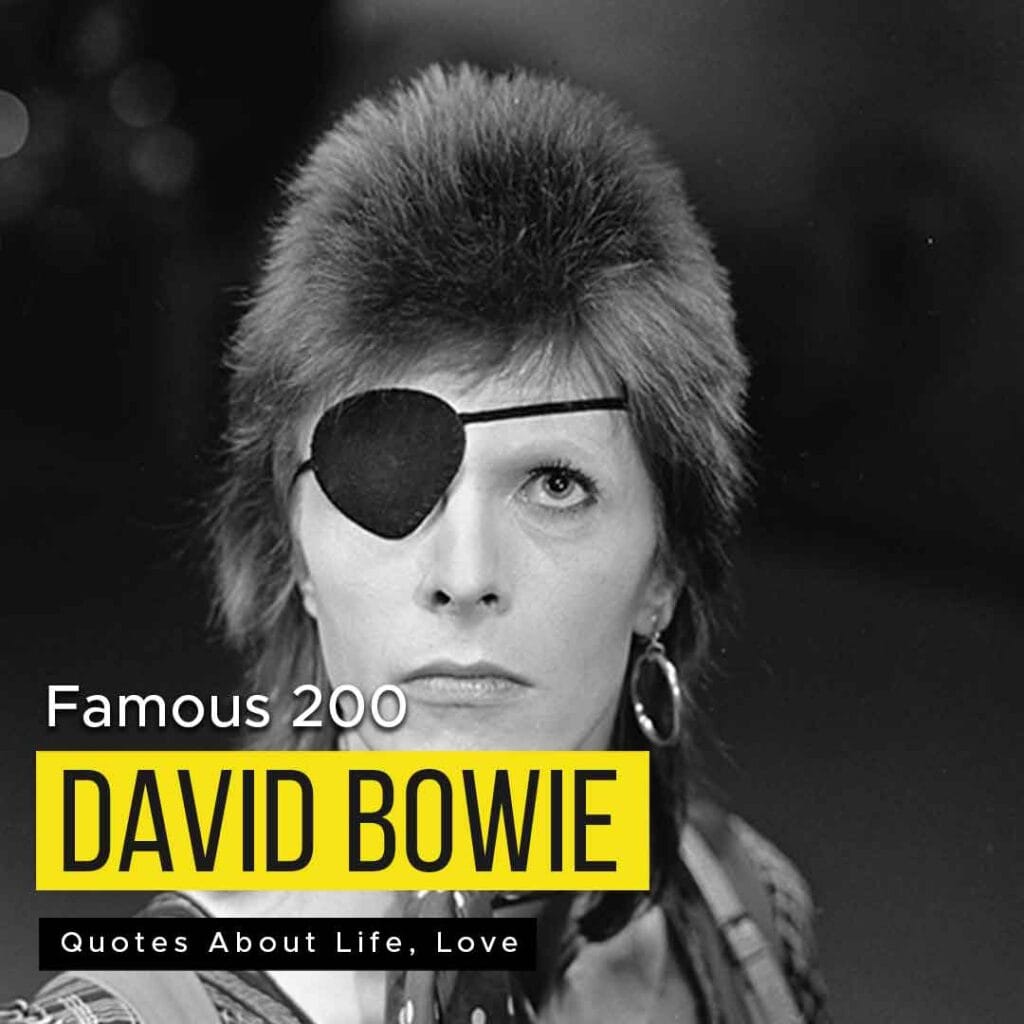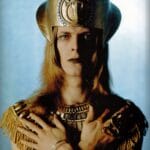Get ready to dive into the mind of a legend! We’re breaking down David Bowie’s most unforgettable quotes—lyrics that danced, ideas that soared, and wisdom that continues to inspire. Think of it as a glimpse into the creative genius that challenged norms, embraced change, and left an indelible mark on music, art, and life itself. Let’s explore the world according to Bowie, from his thoughts on artistic freedom and reinvention to his musings on life, death, and the great beyond.
Embracing the Unknown
One of Bowie’s most enduring qualities was his fearless approach to life and art. He seemed to thrive on the thrill of the unknown, as perfectly captured in his famous quote:
- “I don’t know where I’m going from here, but I promise it won’t be boring.”
This wasn’t just a catchy lyric; it was a philosophy that permeated his entire being. Bowie wasn’t afraid to experiment, to evolve, to constantly surprise us with unexpected twists and turns. This openness to new experiences and his willingness to challenge the status quo are what made him such a captivating and enduring figure.
A Kaleidoscope of Identity: Reinventing Himself and Us
David Bowie was the master of reinvention. He wasn’t just one person; he was a constellation of personas, each reflecting a different facet of his artistry and pushing the boundaries of identity itself. This constant evolution wasn’t about superficial changes; it was a deep dive into the core of creativity and a challenge to the way we perceive ourselves and others.
- “I find only freedom in the realms of eccentricity.”
Bowie dared to be different, to embrace the unconventional, and to find liberation in the fringes of society. He showed us that true freedom lies in celebrating our individuality, even the parts that make us a little “out there.” His fearlessness in challenging norms reminds us that we don’t have to conform to expectations to be extraordinary.
- “These days, I see myself as a transitional object. I’m a bridge between two eras.”
Bowie possessed an uncanny ability to anticipate cultural shifts, effortlessly bridging the gaps between generations and genres. He was a chameleon, adapting to the changing times while remaining true to his own artistic vision. His sensitivity to cultural evolution suggests an innate understanding of the cyclical nature of trends and the importance of adapting to stay relevant.
- “I have no problem with change. I find it exhilarating. I think the only way to make progress is through change. You have to keep moving, keep evolving.”
Change can be daunting, but Bowie saw it as an invitation to grow, to explore, and to become more than we were yesterday. For him, stagnation was the enemy of creativity. His life was a testament to the power of embracing change, of constantly pushing boundaries, and of evolving as both an artist and a human being.
The Art of Reflection: Music, Creativity, and Self-Discovery
Bowie’s genius wasn’t just in his music; it was in his ability to tap into the raw, emotional power of sound and use it as a canvas for introspection and self-expression. His music wasn’t just for listening; it was for feeling, for questioning, for discovering hidden truths about ourselves and the world around us.
- “Sometimes you stumble across a few chords that put you in a reflective place.”
He understood that music has a unique ability to evoke emotions, to transport us to different times and places, and to unlock memories and feelings we might not even know we have. He wasn’t just creating songs; he was crafting experiences, inviting us to share in his creative journey and discover our own along the way.
- “I think the whole point of art is that it’s a mirror. You can look at a piece of art and see yourself.”
For Bowie, art wasn’t a passive experience; it was a dialogue—a way to connect with ourselves and the world around us on a deeper level. He saw its power to reflect our own experiences, thoughts, and emotions back at us, prompting introspection, self-discovery, and a deeper understanding of the human condition.
- “If you feel safe in the area you’re working in, you’re not working in the right area. Always go a little further into the water than you feel you’re capable of being in.”
Bowie was a firm believer in pushing boundaries, in venturing outside our comfort zones to discover new depths of creativity. This philosophy is evident in his own work, which was constantly evolving, always pushing the envelope, and never afraid to challenge the status quo. His advice reminds us that true growth and innovation happen when we dare to explore the unknown, even if it makes us a little uncomfortable.
Life, Death, and the Great Beyond: Bowie’s Cosmic Perspective
Bowie’s musings on life and death were as profound and thought-provoking as his music. He seemed to possess a cosmic perspective, viewing these concepts not as endpoints but as integral parts of a larger, interconnected tapestry.
- “The truth is, of course, that there is no journey. We are arriving and departing all at the same time.”
He challenged conventional notions of time and existence, suggesting that life is not a linear journey but a constant state of flux—a dance between beginnings and endings, arrivals and departures. His words encourage us to reconsider our place in the grand scheme of things and to find beauty in the impermanence of it all.
- “Religion is for people who fear hell, spirituality is for people who have been there.”
This quote hints at Bowie’s own spiritual exploration, a journey that seemed to transcend organized religion and delve into something more personal, more experiential, and perhaps even a bit darker. It suggests that true spiritual growth comes from confronting our fears, exploring the unknown, and grappling with the big questions of existence.
- “My death? I want it to be as beautiful as my life. I want it to be as beautiful as a sunrise and as peaceful as a sunset.”
Even when contemplating his own mortality, Bowie found a way to infuse it with artistry and grace. He envisioned his death not as an ending but as a natural transition, a final act in a grand performance. His perspective encourages us to approach death not with fear but with acceptance and even a sense of wonder.
What Did David Bowie Say Before He Died?
While the exact words David Bowie uttered in his final moments remain a private matter, we can piece together clues from his final album, “Blackstar,” his public appearances, and his communications to gain insight into his state of mind. Released on his 69th birthday, just two days before his death, “Blackstar” is rife with lyrical and symbolic references to death and dying, leading many to interpret it as a deliberate farewell.
Adding to this poignant narrative is a letter penned by Bowie himself, later read aloud at the Brit Awards by his friend and collaborator, Gary Oldman. In it, Bowie expressed deep gratitude for the experiences his music career afforded him, stating, “Music has given me over 40 years of extraordinary experiences… I’ve blown my mind and I hope yours too.” This heartfelt message suggests a man reflecting on a life well-lived and hoping to impart a sense of wonder and inspiration to those he left behind.
Though shrouded in mystery, Bowie’s final days seem to have been marked by a combination of creative output, heartfelt gratitude, and a quiet acceptance of his fate. His approach to death, using creativity as a means of processing his mortality, continues to resonate deeply with people around the world, encouraging us to face life’s challenges with courage, authenticity, and a touch of artistry.
Which Movie Starts with a David Bowie Quote?
The 2022 documentary, “Moonage Daydream,” a visually stunning and immersive exploration of David Bowie’s life and career, opens with a powerful quote from the artist himself:
“At the turn of the 20th century, Friedrich Nietzsche proclaimed that God is dead and that man had killed him. This created an arrogance with man that he himself was God. But as God, all he could seem to produce was disaster. That led to a terrifying confusion: for if we could not take the place of God, how could we fill the space we had created within ourselves?”
This quote, delivered by Bowie in 2002, reflects his deep engagement with philosophical ideas and his ongoing exploration of humanity’s search for meaning in a world without easy answers. Director Brett Morgen’s decision to open the film with these words sets the stage for a thought-provoking journey into the mind of an artist who constantly challenged conventions, embraced change, and sought to understand the human condition through his art.
What Was David Bowie’s Phobia?
Behind the dazzling persona and cosmic stage presence, David Bowie was a human being with his own set of fears and anxieties. One such fear, which he openly discussed, was aviophobia—the fear of flying. This phobia was so intense that it significantly impacted his touring schedule, often leading him to choose trains or boats over airplanes, enduring long and arduous journeys just to avoid taking to the skies.
In true Bowie fashion, he didn’t let his fear control him. He recognized the importance of connecting with his fans worldwide and found ways to manage his anxiety, even channeling it into his music. His song “Afraid of Americans” is a testament to this, showcasing his ability to transform personal struggles into art. Bowie’s experience with aviophobia reminds us that even the most iconic figures face their own battles, and their courage lies in finding ways to navigate those fears and live their truths.
For Further Exploration:
- For all of your David Bowie picture needs, you’ve come to the right place!
- Edwin Booth is considered to be one of the greatest Shakespearean actors of the 19th century.
- If you haven’t stumbled upon Einstein tongue images yet today, then you’re missing out.
- Unveiling Bernhard Caesar Einstein’s Scientific Achievements: A Legacy in Engineering - July 15, 2025
- Uncover who is Jerry McSorley: CEO, Family Man, Business Success Story - July 15, 2025
- Discover Bernhard Caesar Einstein’s Scientific Contributions: Unveiling a Legacy Beyond Einstein - July 15, 2025
















3 thoughts on “I Don’t Know Where I’m Going, But…: Exploring the World Through David Bowie’s Most Iconic Quotes”
Comments are closed.